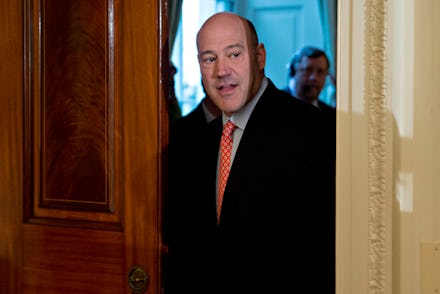Trump adviser ordered Goldman traders to keep working on 9/11, according to a documentary

Thanks to his new role as head of the National Economic Council, former Goldman Sachs President Gary Cohn, is in the limelight.
This week brought a flood of fresh stories about Cohn — who was also Goldman's COO until stepping down as President Donald Trump's pick to run the NEC — and the $285 million sendoff he's set to collect from the bank.
Amid all the scrutiny, an anecdote from a 2012 documentary about the power and culture of Goldman has gone overlooked. In the movie, a former Goldman Sachs official makes the claim that Cohn remained fixated on making a profit in the immediate aftermath of the Sept. 11 attacks.
In "Goldman Sachs - The Bank That Rules the World," Nomi Prins, a former managing director at the firm, recalled being at the Goldman building in lower Manhattan when two hijacked planes struck the Twin Towers.
There was shock, confusion and fear, she said. Smoke billowed past the windows. All the implications were not clear yet, but it was definitely a disaster. And there was Cohn on the trading floor, Prins alleged on film, with orders for the Goldman crew: "Keep trading."
In the documentary, Prins claimed:
"All we knew was that an airplane had hit the building. Gary Cohn, the head of the commodities area, who is now the president of Goldman, was telling his traders to keep trading because his gut instinct was that he could make money from whatever was going on because it had to do with planes, it had to do with oil, so they could make money."
"I think these guys really are so in the game and they're so wrapped up in their own entitlement and their own egos and their own participation and where they're going with it that they just don't care about anybody else," Prins said in the film.
Prins, who has written extensively and critically about Goldman since leaving in 2002, elaborated on the story in a phone interview this week.
Cohn, who will advise Trump on economic policy as director of the NEC, "is able to react very quickly," Prins said. "That's what made him look good at running trading, and good as a trader: He reacted quickly, and basically said, 'You know, you should be trading,' to the traders."
"So while there was a sort of questioning as to what was going on and [a] combination of, at that point, both panic and uncertainty, what he wanted to have continue was for Goldman and the traders [to] take advantage of that volatility or that chaos in the trading of oil, which would be the commodity most related to airplanes."
"I don't think he was trying to put anybody in danger. I think given that we didn't know what was going on, he wanted to make sure that trading was continuing," said Prins of the plane crash that Cohn and his traders did not immediately understand to be the deadliest terrorist attack on American soil in the country's history.
She also said the two had a cordial farewell chat when she resigned from the bank.
Veteran financial reporter Marc Roche, who co-wrote the film, said in a phone interview this week that the recollections from Prins appeared in his documentary to illustrate the intensity of the Goldman mindset.
Roche said Prins was "quite convincing, on and off camera, but no one has ever confirmed [her account] to me," although he said it dovetailed with other descriptions of Cohn's style he gathered in the course of his reporting.
Goldman, Roche said, refused to cooperate in the making of the film.
A spokesperson for Goldman deferred questions about the documentary to the White House press office, which did not immediately respond to a request for comment.